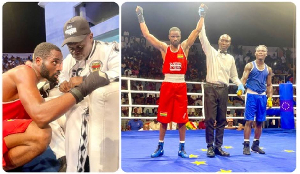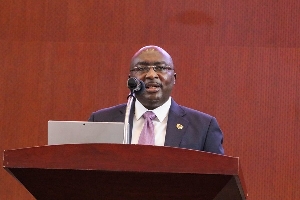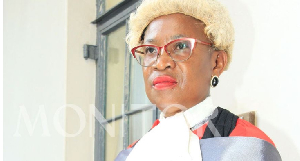- Home - News
- TWI News | TV
- Polls
- Year In Review
- News Archive
- Crime & Punishment
- Politics
- Regional
- Editorial
- Health
- Ghanaians Abroad
- Tabloid
- Africa
- Religion
- Election 2020
- Coronavirus
- News Videos | TV
- Photo Archives
- News Headlines
- Press Release
General News of Wednesday, 2 July 2014
Source: Regina Asamoah
National Forum on gender equality and women’s rights
The Gender Studies and Human Rights Documentation Centre (Gender Centre) are organizing a one day forum for key stakeholders on the theme: “Proactive Engagement to ensure Women’s Participation in Decision making at the Local Level – Collective responsibility of Government and Civil Society Organizations” tomorrow Thursday July 3, 2014 at the Kama Conference Centre in Accra.
The issue of low participation of women in politics and public life in Ghana over the years has remained a major issue of concern to all key stakeholders and indeed all women right activists.
Ghana is a signatory to a number of human rights instruments including the United Nations (UN) Convention on the Elimination of all forms of Discrimination against Women (CEDAW) and the African Union’s Protocol to the African Charter on Human and Peoples rights on the rights of women.
The Beijing Platform for Action sets a target of 30% representation of women in decision making positions at all levels. In spite of these international and regional instruments and national advocacy on the part of women’s rights organizations, there has not been much improvement in women’s political participation and representation at all levels.
Currently, women represent 12.89% of the total political appointments in Ghana. These include, sector / deputy sector ministers, regional / deputy regional ministers, council of state members and Metropolitan / Municipal / District Chief Executives.
The breakdown is as follows: ministerial- 7 (24.1%) out of 29; regional minsters- 1 (10%) out 10; deputy regional ministers- 2 (20%) out of 10; and Council of State Members- 4 (17.4%) out of 23 (as at June 23rd, 2014, www.ghanaweb.com).
Similarly, in terms of leadership positions at the district level, only 16 (8.2%) of the 195 MMDCE’s are women.
When it comes to elective positions, women do not fare any better. At the 2012 elections, of the 133 women who contested the parliamentary elections, only 30 were elected representing 10.90% of the 275 total membership.
Also, in the 2010 district assembly elections, 412 of the 1376 women who contested the elections were elected representing 10% of the total number of elected seats.
Research findings indicate that several factors deter women from taking up leadership positions at all levels. According to Beatrix Allah-Mensah (2005), some of the factors militating against women’s representation in politics and public life include traditional and cultural factors which re-enforce perceptions that participation in politics and public life is the preserve of men.
For instance, women who want to participate in politics may need to obtain permission from their partners and other family members mostly men. Other challenges include: lack of self- confidence on the part of women, low level of economic independence and limited literacy for most women who subsequently lack access to information and proper utilization of available information and opportunities.
It is against this backdrop that the Gender Studies and Human Rights Documentation Centre (Gender Centre) is organizing a one day forum for key stakeholders on the theme: “Proactive Engagement to ensure Women’s Participation in Decision making at the Local Level – Collective responsibility of Government and Civil Society Organizations” on Thursday at the Kama Conference Centre in Osu, Accra.
It is to discuss and develop strategies which will ensure increased participation and representation of women in decision making. The discussions will focus on the up-coming 2014 district assembly elections.
Key among the objectives of the forum is to identify key challenges that deter women from taking up elective positions and develop strategies for supporting women seeking to contest in the up-coming DA elections.
It is expected that at the end of the forum Strategies for supporting women seeking to contest in the up-coming DA elections will be developed as well as a joint communiqué on advocacy strategies issued.










